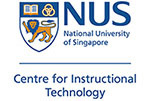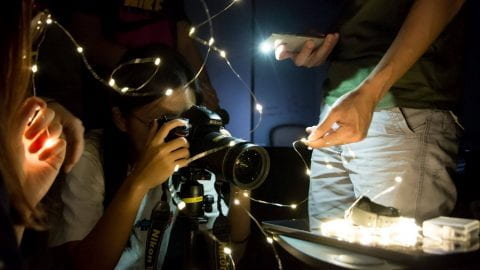
NUS' geNiUSchannel and geNiUSbooks serve as online learning resources by and for the NUS community (stock image taken before the pandemic)
From delving into the world of eggs to executing a cardiopulmonary bypass, online learning is taking on exciting new forms.
Increasingly, we are seeing a new wave of interactive eBooks and engaging video vignettes that push the envelope of learning on LumiNUS, NUS’ Learning Management System.
In a bid to catalyse more of such innovative digital education content in its geNiUSworld multimedia repository, NUS launched the inaugural geNiUSchannel and geNiUSbooks 2021 competition to recognise the most creative video and eBook resources produced by the NUS community.
Speaking at the competition, Associate Professor Erle Lim Chuen Hian, NUS Vice Provost (Teaching Innovation & Quality), said the use of the word ‘geNiUS’ is aspirational. “Rather than saying that we are all geniuses…we hope to become more intelligent and clever as we share materials,” he said.
He added that he hopes the competition encourages staff and students to explore the functions in the geNiUSworld platform. “I think you will be just as surprised as I have been by the creations that we are going to highlight.”

The inaugural geNiUSchannel and geNiUSbooks competition encourages NUS educators and students to create video vignettes and interactive ebooks, and honours the most creative video and eBook resources produced by the NUS community.
Professor Bernard Tan, NUS Senior Vice Provost (Undergraduate Education) and Shaw Professor in Information Systems and Analytics, said that geNiUSworld is an integral part of the university's technology-enhanced learning initiative.
Recognising that learning in the future will be an amalgamation of physical and online experiences, he added, “Moving forward, geNiUSchannel and geNiUSbooks would be a great resource for our colleagues – many of whom would be developing blended learning modules under our Blended Learning 2.0 initiative.”
For Associate Professor Soo Yuen Jien of the NUS School of Computing, who presided as one of the competition judges, what struck him was the sheer quantity and impressive quality across all the competition entries.
“It was certainly very challenging for me to pick the top winners in each of the categories,” shared Assoc Prof Soo, who is also the director of the NUS Centre for Development of Teaching and Learning (CDTL).
Here are some of the winning ideas.
geNiUSchannel Top Prize
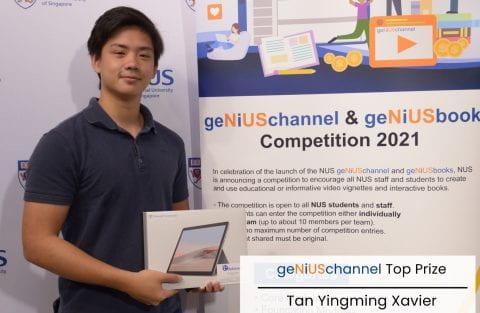
Xavier’s team’s project elucidates the under-researched topic of the impact on the marine environment that undersea cable networks have.
The Internet – Submarine Cables
We have come to rely heavily on the internet for business and pleasure, especially during this pandemic where many aspects of daily life have shifted from physical to virtual mode.
Yet unbeknown to many, the network relies on over a million kilometres of transatlantic undersea cables to transfer data across continents at the speed of light. These cables often come at a cost to the marine environment, such as disturbance to the seabed as they are laid.
Presented as a skit, the explainer video sheds light on an under-researched topic.
“We hope that this video is one of many to inspire generations of viewers and students to not only create their own content, but also to be appreciative of the world we have and not take things for granted,” said Xavier Tan, one of the five members of Team Radial 256 who hail from different faculties.
“If we do not maintain a balance between rapid urbanisation and conservation, we are likely to face irreparable losses in the coming years.”
geNiUSchannel Best Teacher Award

Dr Paranjothy strives to make class content accessible to learners, especially for students of the 21st century.
Principles of Cardiopulmonary Bypass
When Dr Suresh Paranjothy jumped into the world of video-making for learning in early 2021, he found the process “quite fun”.
“We need to make education interesting, entertaining and accessible to our students. This is what I tried to accomplish with these e-learning videos,” said the Assistant Professor from the Department of Anaesthesia at the Yong Loo Lin School of Medicine.
Explaining how teaching and learning strategies should evolve, he noted that the current crop of students learns better by watching video tutorials than through traditional books and lectures.
The feedback from his students has been positive, and Dr Paranjothy observed that they have been able to quickly pick up the important points through his videos.
“Videos and e-learning are a great way to deliver education to students… It was challenging at first and quite time-consuming, but the end-product was worth the effort.”
geNiUSchannel People's Choice Award

MERJA sheds light on the ownership process and legal implications of purchasing property.
Purchasing Private Properties in Singapore: Legal Matters
Buying a property is a big financial decision. But not everyone is familiar with the ownership process and its implications.
After learning about these in a compulsory law module as part of their real estate studies programme at NUS Business School, the 5-member Team MERJA thought many could benefit from their newfound knowledge. So they produced an animated video, which provides a quick explainer on the steps involved when purchasing a completed private property, the two types of co-ownership and their implications, and how matrimonial property may be divided upon separation or divorce.
geNiUSbooks Top Prize
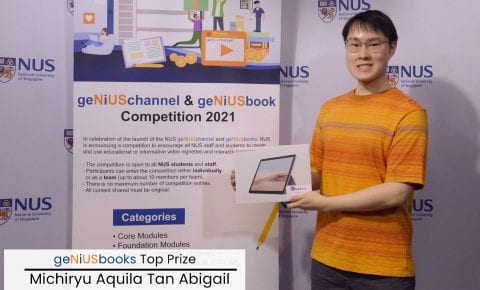
Aquila Tan’s team, The Egg Enthusiasts, created their educational eBook to engage young children through hands-on experiments.
Egg-ceptional Wonders!
As one of the world’s most versatile foods, eggs are widely consumed and enjoyed. But what about the science behind them?
The eBook is a collection of six family-friendly experiments. Created on Microsoft Sway, the interactive eBook incorporates multimedia elements such as cute hand-drawn illustrations and engaging videos that appeal to its target audience of young children with short attention spans.
“We hoped to create an eBook that is both educational and fun, where children can not only learn more about eggs through reading, but also through some fun and engaging ‘egg-periments’,” said Aquila Tan from The Egg Enthusiasts, the trio of students behind the project, all from the NUS Faculty of Science.
geNiUSbooks Best Innovation & Best Teacher Awards
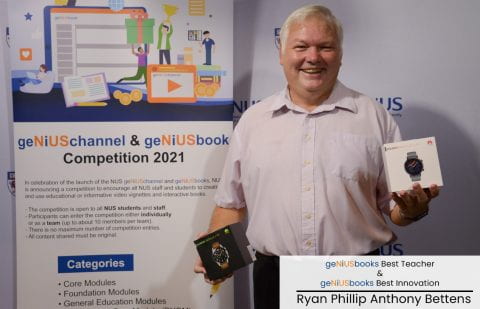
Prof Bettens bagged two awards for “geNiUSbooks Best Teacher” and the “geNiUSbooks Best Innovation”.
Scientific Explanations and Models & The Founding of Modern Science
When Associate Professor Ryan Phillip Anthony Bettens from the Department of Chemistry first started teaching at NUS in 2000, he saw himself more as a lecturer than a teacher, believing that the onus of learning fell solely on students.
Today, Prof Bettens sees it as his job to engage students. It is this engagement – what the students actually do – that “really sinks in and enhances learning”.
“Ultimately, each student must take responsibility for their own learning. But as teachers, we can do a lot to promote and assist them in that,” he explained.
Bagging two awards proves Prof Bettens has certainly been successful in helping his students learn better. His strategy involves adopting different teaching methods and materials to pique and sustain their interest.
After moving his College of Humanities and Sciences core undergraduate module – Scientific Inquiry I – to Microsoft Sway, feedback from his students has been largely positive, with many appreciating the quizzes that come after each learning video to reinforce their learning.
Prof Bettens believes that useful features such as automatic transcription of videos, additional notes and related resources presented logically and attractively in Sway motivate students to learn and engage better with the course content.
geNiUSbooks People's Choice Award

The lecturer-student duo reworked the format of a popular computing textbook to make the learning experience more engaging and immersive.
Interactive SICP JS
To make reading and learning from a popular computing textbook more engaging and seamless, a lecturer and student from the School of Computing teamed up to produce an interactive version of it.
Associate Professor Martin Henz and Samuel Fang Junwei reworked the format of Structure and Interpretation of Computer Programs – JavaScript Adaptation (SICP JS) so readers get to see more than just static figures and diagrams. Instead, clicking on the thumbnails activates the web-based coding plugin within the eBook, which allows readers to directly experiment with and edit the script without leaving the confines of the Microsoft Sway textbook.
This saves them the hassle of toggling between windows and copying lines of code, leading to a seamless and uninterrupted experience that allows them to concentrate on visualising data structures in a more immersive manner.
